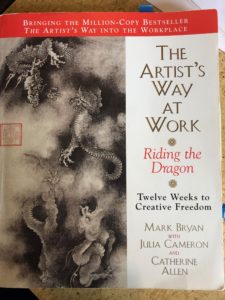What is creativity?
 There are so many ways to answer this question, I’ve struggled to even start writing this blog post. Spiritual, neurological, psychological, intellectual, artistic – there are definitions of creativity that are specific to each of these realms. And, as you would expect, some of them contradict each other. There are myths and belief systems built around the idea of creativity. From the Muses of Greek mythology who inspire artists to the stereotypes of the drunken writer or starving artist to those who seem to strike gold with their books, movies, songs, or plays – our ideas about creativity run the gamut from scary to desireable.
There are so many ways to answer this question, I’ve struggled to even start writing this blog post. Spiritual, neurological, psychological, intellectual, artistic – there are definitions of creativity that are specific to each of these realms. And, as you would expect, some of them contradict each other. There are myths and belief systems built around the idea of creativity. From the Muses of Greek mythology who inspire artists to the stereotypes of the drunken writer or starving artist to those who seem to strike gold with their books, movies, songs, or plays – our ideas about creativity run the gamut from scary to desireable.
Creativity in practice
When I lead workshops on creativity and leadership, I often ask participants if they see themselves as creative. Usually less than half the people in the room raise their hands. Since this is in a workshop about creativity, I suspect it skews high compared to the general public. One of my favorite activities in workshops like this is to ask everyone to write their favorite hobby on a bit of paper. (I’ve learned I have to give two pieces of guidance: “Playing with your kids may be your favorite thing to do, but it’s not a hobby.” and “Even if you don’t have time to do it right now, name a hobby you’d like to do.”)
Next, small groups each pull a hobby from the pile. Their assignment is to create a leadership workshop using that hobby. Occasionally, a hobby has to be explained. Orienteering caught people by surprise as did raising exotic roosters. Odd or familiar as the hobby is, they always accomplish the task. Participants develop wonderful, funny, interesting – and doable – workshop oultines in just fifteen minutes. The room is full of creative people who are shortchanging themselves.
What do you believe about creativity?
Julia Cameron partnered with two colleagues from the business world to take her book The Artist’s Way into the world of work. The Artist’s Way at Work: Riding the Dragon includes two quizzes – one on leadership and one on creativity. I prefer the questions of the leadership quiz and have adapted it to be a creativity quiz when I use it in workshops. (I think their creativity quiz is useful for people who want to dig deeper into their past experiences.)
Here are a few of the questions I have adapted for use in my workshops.
- In my family, creativity was considered ______.
- In school, I learned creativity was __________.
- As a rule, creative people are ______________.
- The problem with creativity is_____________.
- My fear about creativity is ________________.
- My hope about creativity is________________.
How do you fill in these blanks? I challenge you to spend a bit of time today reflecting on your ideas about creativity. Your own creativity, the creativity of great artists, and the creativity of the people you work with. Who do you identify as creative? Why? Do you think you are creative? Why or why not? Is creativity supported in your workplace? Do you support creativity for your staff members? What might you do differently to encourage more creativity in your workplace?
I’d love to have you share what you discover in the comments!
Bryan, M., Cameron, J., and Allen, C. (1998). The Artist’s Way at Work: Riding the Dragon: Twelve Weeks to Creative Freedom. Quill: New York.
